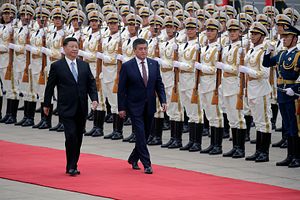With arrests, the investigation stemming from the breakdown of the Chinese-modernized Bishkek Heating and Power Plant earlier this year has entered a new phase. Meanwhile, Kyrgyz President Sooronbay Jeenbekov is in China for a state visit, hoping to keep the bilateral relationship insulated from the firestorm building back home and former President Almazbek Atambayev has denounced a “witch hunt” against his allies.
A Domestic Political Firestorm
Less than a week after charges were filed, former Kyrgyz Prime Minister Sapar Isakov was arrested. Former Bishkek Mayor Kubanychbek Kulmatov was also arrested following corruption charges issued on May 18. Isakov was reportedly ordered into two months of pre-trial detention whereas Kulmatov’s lawyer said his client would be held in detention until June 28.
The Bishkek power plant, which failed during a cold snap in January, had been modernized by a Chinese company — Tebian Electric Apparatus Stock Co. Ltd. (TBEA) — with work completed the previous fall. Investigations into the plant’s failure led to deeper questions about the modernization project and the arrangements that led to TBEA’s selection, sans tender.
Isakov stands accused of lobbying on behalf of TBEA. At the time he was serving as deputy head of the presidential administration and spearheading work on foreign investments.
The charges against Kulmatov, who until recently served as head of the customs service, alleged that when he was mayor of Bishkek, he redirected $2 million in Chinese grants given as part of the overall 2013 Chinese financial aid package that included the power plant’s modernization.
Both men are viewed as staunch allies of former President Atambayev, with whom Jeenbekov’s relations have deteriorated significantly. Atambayev said in a statement published on June 6 that the decision to arrest Isakov and Kulmatov “is not a fight against corruption.” He went on to argue that neither Isakov nor Kulmatov “were empowered to independently make the decisions that were the basis of the charges brought against them by the investigation.” Instead, he said, he made the relevant decisions as president.
“Under a motto of the fight against corruption, in fact a ‘hunt for witches’ has begun,” Atambayev said, denouncing the criminal prosecution of former Jalal-Abad mayor Salaydin Avazov (in 2014, then-director general of Electrical Stations, the state-owned company that manages Kyrgyzstan’s power-generating facilities) and others as “politically motivated and unfounded.”
Atambayev may find himself pulled into the expanding tumult as the Kyrgyz constitutional chamber accepted a petition to evaluate the constitutionality of presidential immunity. “The absolute inviolability of the ex-president in accordance with the Law On Guarantees of the President’s Activities contradicts the constitutional principle of equality of all before the law,” lawyer Nurbek Toktakunov wrote on Facebook. Parliament is also discussing a bill to remove presidential immunity.
From Domestic Problem to Bilateral Irritant?
The 2013 Chinese aid package, which is the root of the power plant project, was delivered in the opening notes of what is now known as China’s Belt and Road Initiative (BRI). As such, while there is a significant domestic political angle to the issue at hand, there is also a bilateral dynamic at play.
Even as the administration of Kyrgyz President Sooronbay Jeenbekov goes after those tied to the Chinese project and grants, the Kyrgyz authorities are wary of linking the issue to bilateral relations with China.
Daniyar Sydykov, Jeenbekov’s foreign relations chief, told journalists on June 4 that the investigation into the power plant failure is “an internal matter of Kyrgyzstan and one should not project this onto Kyrgyz-Chinese relations.”
Given that in testimony to the parliament, Isakov commented that the selection of TBEA “was the official position from China and we could not change this” it seems reasonable to connect the brouhaha over the plant project to the dynamics at play in the Kyrgyz-Chinese relationship.
On June 6, Jeenbekov began a state visit to China, which will culminate with his attendance at the June 9-10 Shanghai Cooperation Organization summit in Qingdao.
While his administration is trying to downplay the bilateral facets of the current domestic political storm in Kyrgyzstan, Jeenbekov nevertheless mentioned in an interview before the trip with Xinhua that Chinese investors “need to observe norms and procedures … in order to ensure the supremacy of the law of the host country.”
There was no public mention of the issue Wednesday when Jeenbekov met with Chinese President Xi Jinping. The two leaders shook hands and agreed to establish a “comprehensive strategic partnership” between Bishkek and Beijing, with the attendant supportive statements about the BRI, the “One China” policy and the fight against the “three evil forces” (terrorism, separatism and extremism).
Back in 2013, Xi and then-President Almazbek Atambayev upgraded the China-Kyrgyzstan relationship to that of a “strategic partnership.”
As Chris Rickleton wrote for Eurasianet, “Land and China make for an explosive combination for governments across Central Asia.”
Adding to the Chinese buzz in Bishkek these days was the surprising decision on May 30 by the Bishkek city council to not consent to a swap deal with Beijing that would have seen the Chinese embassy’s lease extended, rent-free, for 49 years in exchange for a new spot and similar terms for the Kyrgyz mission in the Chinese capital. The council reversed its decision the next day, but the bump highlights, again, spots of tension between Kyrgyzstan and China.
Jeenbekov is unlikely to spoil the good spirits at the SCO summit in Qingdao, but when he returns to Kyrgyzstan he’ll have enough of a mountain of issues to navigate — both domestic and external — to care.

































